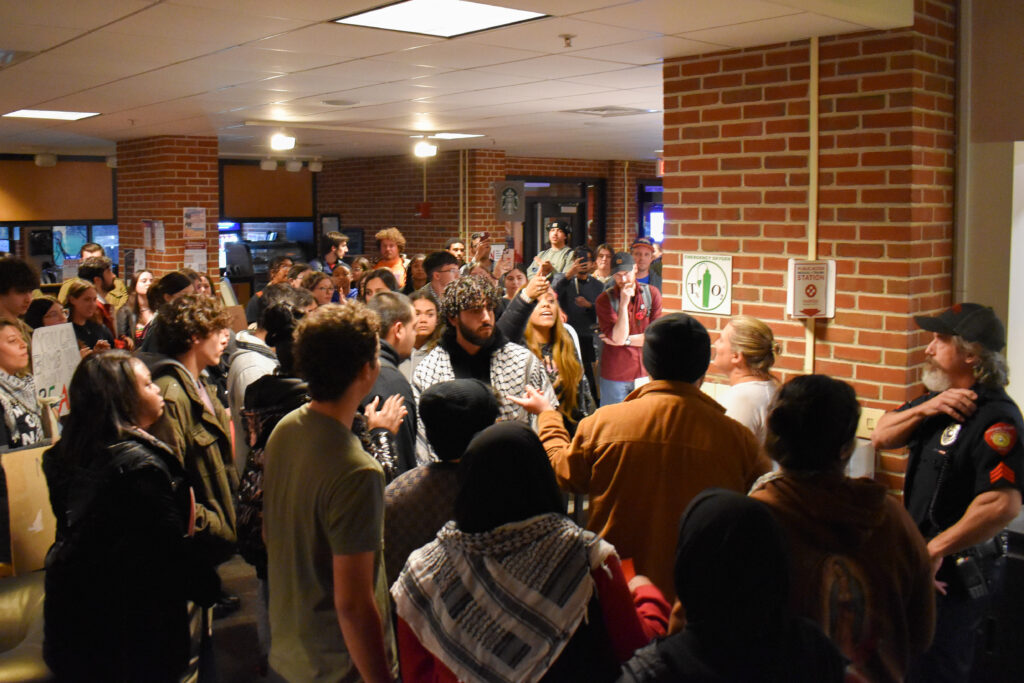This story is still developing. To make a comment contact weeklyeditor@gmail.com.
Muhlenberg College’s Hillel hosted Amanda Berman, founder and executive director of Zioness, for an event on Mar. 27. The mission of Berman’s organization, according to their website, is to “Equip and inspire Jews and allies to fight for social justice in the US as proud Zionists.” Berman’s talk covered topics relating to whether or not anti-Zionism is inherently antisemitic, whether one could simultaneously be Zionist and pro-Palestinian and what the intersection of Zionism and feminism looks like. The talk was held to a packed crowd in Seegers 108-109 with a livestream playing to another audience that filled the GQ Annex. Tensions were high before the event started as students assembled alongside community members who came to campus prepared to protest.
The event was structured as a conversation moderated by two students who asked Berman questions, followed by an open Q&A. Berman expressed her support of a sovereign Jewish state, saying, “knowing that that’s my home (Israel), ultimately, knowing that that’s the only place in the world that I can be safe as a Jew, that to me is what it means to be a Zionist, and for the vast majority of American Jews.”
“Every border and every national entity that exists,” continued Berman, “the borders were drawn in blood, they were drawn with ethnic strife and war, nation states are not born peacefully, [and] have never been born peacefully. Zionism as a political movement, again, is about a nation state.”
One of the panel’s moderators asked Berman to share her experience with Diversity, Equity, Inclusion and Belonging (DEIB) on other college campuses supporting Jewish life during periods of tension. “There is a misunderstanding that because people see my skin color, which obviously is white,” responded Berman, “they assume that I am an oppressor because people make assumptions about Jews based on their relative success. And for sure, there is relative success of Jews in America in 2024. They assume that Jews do not and could not – because we are perceived as white – experience persecution or oppression.”
The crowd in Seegers 108-109 was not fully in support of Berman’s views – a large number of audience members were holding signs expressing pro-Palestinian sentiments and wearing the keffiyeh.
“Myself and the other organizers came together as students representing a broad mix of identities and backgrounds,” said an organizer of the protest who chose to remain anonymous. “We are unaffiliated with any particular club or organization, but we share one common goal—justice, liberation, safety, and dignity for the Palestinian people. Though we attempted to have this event canceled by putting pressure on the administration, we knew that it would likely go on. So, we figured, if they have the freedom to host an event like this, then we also have a right to dissent! We organized very quickly and spread the word by mouth and on social media. We tried to adhere to the strict guidelines of the Right to Dissent policy, while also fully recognizing how ridiculous it is to have a protest operate within a set of rules in the first place.”
During the Q&A section of the event, many audience members expressed their objection to Berman’s views through their questions. “Jewish values are what motivated me as an anti-Zionist Jew to face against the colonial and racist ideology of Zionism,” said an audience member to Berman. “I want to ask you about what you think about the antisemitic aspects of Zionism, the role that Zionism plays in isolating and alienating Jews.”
The Q&A portion morphed into a debate-like forum and the event abruptly ended.
“This was pretty extreme,” said Berman to the Weekly following the talk, noting that she had been protested before, “I think most of the people who brought me here were not actually able to be in the room. So, I feel sorry for them about that. But yes, there have been protests before. And I really think this was pretty constructive engagement.”
Dean Williams informed the Weekly that an incident occurred as audience members were filing out of the room where the event was held. “There was a back-and-forth altercation,” she explained, “I did not know at the time who it was between or what was done, but it has been followed up on by Campus Safety.” As Williams was working to disperse the crowd, a group of students approached both Williams and Associate Dean of Students Courtney Stephens to express both their disgust and concern with how the College has been handling the tensions on campus. As Williams and Stephens began a dialogue with the concerned students, the crowd grew and took over much of the Fireside Lounge in the front of Seegers.
Many of the individuals engaging in this exchange were people of color who expressed to the deans the experiences they have had with mistreatment and racism while at Muhlenberg.
“I think there was a lot of emotional buildup that has happened from the media, from the news, from their family members from all these spaces, that kind of collided in that moment. And it creates kind of a powder keg, if you will, of that feeling,” said Williams.
Additional Reporting by Sarah Wedeking ‘24

